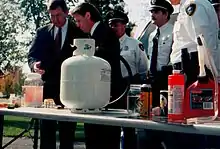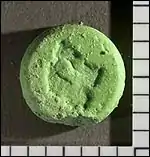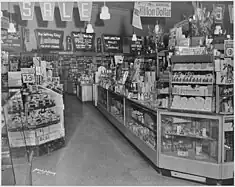Drug policy of Missouri
The drug policy of Missouri involves the policies, measures and laws set by Missouri Senate and the Missouri House of Representatives in order to stop citizens from misusing drugs.

Legal measures against drug abuse
To counteract drug abuse in Missouri, the Substance Abuse and Mental Health Services Administration gave two grants worth a total of 66 million dollars to the Missouri Department of Mental Health, to cover building costs of rehabilitation centers.[1] In addition, The Department Of Mental Health launched a public education campaign to educate children about prescription drug addiction.[2] SAMHSA also created a drug abuse hotline to help addicts get treatment.[3] The United States government also created the “Keepin’ It REAL Program,” as a replacement for the D.A.R.E. Program, after it lost funding in 1998.[4] In addition, citizens have reported to the Missouri State Highway Patrol 530,596 people for drug possession from the years of 2001–2014.[5]
Amphetamine usage

As of January 1, 2017, it is illegal to possess more than 24 grams of methamphetamine percursors.[6]
In 2019, Missouri was labeled "America's Meth Production Capital”, after a study carried out by rehabs.com found it to have the highest number of meth labs per capita.[7]
The Drug Enforcement Administration labels methamphetamine as a schedule 2.[8]
Cannabis usage
As of November 6, 2018, medical cannabis was legalized in Missouri.[9] Recreational marijuana is legal in Missouri.[10] It was illegal to have both a Medical Card and a CCW simultaneously in Missouri, but after state legislators passed a law, it is now legal to obtain both.[11]
On December 8, 2022, marijuana was legalized for possession of up to three ounces.[12] Licenses for ownership of dispensaries began being issued on February 30, 2023. With the legalization of recreational cannabis, Missouri became the 21 state to do so.[13]
The Drug Enforcement Administration labels cannabis as a schedule 1.[14]
Hallucinogen usage
In 2010, 28,498 mentions of hallucinogen possession were recorded by Missouri Department of Health and Senior Services. Hallucinogens are not the most used illicit drug in Missouri.[15][16] A bill titled “HB 869” was proposed to the Missouri House of Representatives in January of 2023. The bill was promoted by state representative Tony Lovasco. The bill aims to loosen the laws against possessing and using psilocybin a kind of psychedelic drug.[17]
Nicotine usage
As of 2018, Missouri had the tenth highest rate of nicotine usage in the United States; with around 10% of Missourian youth smoking nicotine. If electronic cigarettes are included in the statistic, then the rate of youth nicotine consumption goes up to 20%.[18] As of July 5, 2022, Juul's vapes, except for the flavorless and mint flavors, were banned by the FDA from the entire United States of America.[19]
On December 20, 2019, the Federal Food, Drug, and Cosmetic Act was updated. This changed the minimum legal age to possess nicotine from 18 to 21.[20]
The Drug Enforcement Administration labels cannabis as a schedule 2.[21]
Opioid usage
Opioids are the most used illicit drug in the state of Missouri.[22] In 2021, there were 1,582 deaths in the state, this accounts for more than 70% of all drug-related deaths in the year 2021.[23] The state of Missouri has provided naloxone to those experiencing overdose. As of 2023, the kratom plant is unbanned from public possession, for anyone over the age of 18 years old.[23] Similarly, the ingredients required to create purple drank have been more restrictive and heavily regulated, especially cough syrup.
The Drug Enforcement Administration labels opioids as a schedule 2.[24]
Prescription medication usage

In the year of 2021, an estimated 235,000 Missourians misused prescription medication in that year.[25] In early 2023, the state government of Missouri issued a statewide prescription monitoring program to all pharmacies in the state. The prescription monitoring program monitors the prescription of everyone, to stop those with a prescription drug addiction from swapping pharmacies to get an early refill on their prescription.[25]
Use in sports
The state of Missouri officially banned the use of steroids and all other kinds of performance-enhancing substances on February 27, 1991, alongside a nationwide ban with the signing of the Anabolic Steroids Control Act of 1990.[26] It is considered cheating to use any kind of performance-enhancing drug in official sports.[27] If found guilty, one can face up to a $1000 fine, and up to a 2-year prison sentence.[27]
Prohibition
Before Prohibition, Missouri was the second largest wine-producing state in the nation, behind Kansas.[28] Prohibition caused Missouri's economy to take a hit, as large wineries like Stone Hill Winery were shut down during prohibition. vineyards were also uprooted, making it impossible to resume production in 1933, when alcohol bans were lifted.
Currently, there are no dry counties in the state of Missouri. In Missouri's constitution, dry counties are prohibited.[28] Missouri is not as strong in the wine industry nowadays, as the west coast of the United States is more commercially dominant in wine production.[28]
See also
References
- "Opioid Crisis Response". dmh.mo.gov. Retrieved 2021-12-28.
- "Prescription Drug Misuse". dmh.mo.gov. Retrieved 2021-12-28.
- "SAMHSA's National Helpline". www.samhsa.gov. 14 May 2014. Retrieved 2021-12-28.
- "keepin' it REAL". youth.gov. Retrieved 2021-12-28.
- "Uniform Crime Reporting Drug Arrest". www.mshp.dps.missouri.gov. Retrieved 2021-12-28.
- "579.110". revisor.mo.gov. Retrieved 2022-09-11.
- "Study ranks Missouri #1 in meth manufacturing". Columbia Daily Tribune. Retrieved 14 September 2022.
- "Information Bulletin: Crystal Methamphetamine". 2012-06-13. Archived from the original on 2012-06-13. Retrieved 2023-05-28.
- "About Us | Health Services Regulation | Health & Senior Services". health.mo.gov. Retrieved 2022-09-11.
- "Recreational marijuana is on Missouri's ballot in November. Critics say to read the fine print". KCUR 89.3 - NPR in Kansas City. 2022-08-15. Retrieved 2022-09-11.
- "Missouri Law Restores Medical Marijuana Users' Second Amendment Rights". Reason Foundation. 2021-07-01. Retrieved 2022-09-11.
- "Data and Reports | Medical Marijuana | Health Services Regulation | Health & Senior Services". health.mo.gov. Retrieved 2023-05-28.
- Bates, Savannah Hawley; Moreno, Carlos (2023-03-05). "Missouri started selling recreational weed 1 month ago. How's it going so far?". KCUR - Kansas City news and NPR. Retrieved 2023-05-28.
- "Controlled Substance Schedules". www.deadiversion.usdoj.gov. Retrieved 2023-10-19.
- Lee, Jerry (September 2012). "NATURE AND EXTENT OF THE ILLICIT DRUG PROBLEM IN MISSOURI" (PDF).
- "Hallucinogens". www.mshp.dps.missouri.gov. Retrieved 2023-05-28.
- "Missouri House of Representatives - Bill Information for HB869". house.mo.gov. Retrieved 2023-05-28.
- "Tobacco Use Prevention and Control | Smoking and Tobacco | Health & Senior Services". health.mo.gov. Retrieved 2022-09-12.
- "FDA Denies Authorization to Market JUUL Products". United States Food and Drug Administration. 2022-07-05. Retrieved 2022-11-07.
- "Tobacco Regulations & Statutes". atc.dps.mo.gov. Retrieved 2022-09-12.
- "Controlled Substance Schedules". www.deadiversion.usdoj.gov. Retrieved 2023-05-28.
- "News Releases | Health & Senior Services". health.mo.gov. Retrieved 2023-04-14.
- "Mental Health and Substance Use State Fact Sheets". KFF. 2023-03-20. Retrieved 2023-04-14.
- "Controlled Substance Schedules". www.deadiversion.usdoj.gov. Retrieved 2023-05-28.
- "Prescription Drug Misuse | dmh.mo.gov". dmh.mo.gov. Retrieved 2023-04-18.
- "Anabolic Steroids". www.deadiversion.usdoj.gov. Retrieved 2022-09-11.
- Concannon, Marie. "Library Guides: Sports in Government Documents: Doping". libraryguides.missouri.edu. Retrieved 2022-09-11.
- "Augusta". www.govinfo.gov. Retrieved 2022-09-11.